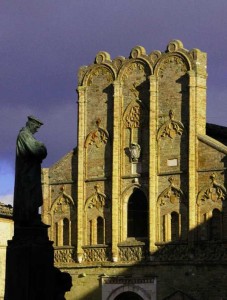Casa Carotondo is located in the commune of San Ginesio. Alberico Gentili is San Ginesio’s most famous son. He is considered to be one of the founding fathers of international law. Having been a student of international relations, his name was already familiar to me before we moved here. Strange I should now be living in his birthplace.
Alberico Gentili was born on January 14th. 1552 into a noble family. He studied law at the university of Perugia and graduated as a doctor of law in 1572. In 1577 he finished a revised version of the statutory laws of his home town. Two years later, together with his father Matteo Gentili, a renowned medical doctor, and one of his brothers, Scipione Gentili (who eventually became a law professor in Germany), he had to flee from Italy because of his Protestant beliefs. After spending some time in Slovenia and Germany Alberico Gentili arrived in England in 1580 and was appointed regius professor of civil law at Oxford University by the then Chancellor, Robert Dudley, 1st Earl of Leicester. Apart from a short stay in Wittenberg, Germany, in 1586, he spent the rest of his life in England.
Although Gentili held the regius professorship until his death, he applied himself more to practical work in London from about 1590. He practised in the High Court of Admiralty, where the continental civil law rather than the English common law was applied. In 1600 Gentili was honorifically admitted to Gray’s Inn. From 1605 to 1608 he served as a standing advocate to the Spanish embassy. He died in London in 1608 and was buried in the Church of St. Helen Bishopsgate in the City of London.
In 1588 Gentili published De jure belli commentatio prima (First Commentary on the Law of War), the first of a three-volume series. A complete, revised edition appeared in 1598 as De jure belli libri tres (Three Books on the Law of War). In his view, international law should comprise the actual practices of civilized nations, tempered by moral (but not specifically religious) considerations. Although he rejected the authority of the church, he used the reasoning of the canon law as well as the civil law whenever it suited his purpose. The Dutch jurist Hugo Grotius, in writing the much better known De Jure Belli ac Pacis (1625; On the Law of War and Peace), drew extensively on Gentili’s work.
There is now a Centro International Studi Gentiliani based in San Ginesio. Its purpose to honour his memory and promote the study of his work. Founded in 1981 the centre has slowly increased its stature in the academic world. Part of its work is educating young people in the province of Macerata about Gentili’s work. 2008 was the 4th centenary of Gentili’s death the Centro held a number of events to commemorate the man and his work. In 2011 Oxford University Press brought out a translation of his De Armis Romanis (The war of the Romans) written in 1599 proving that Gentili’s work still has relevance today.

